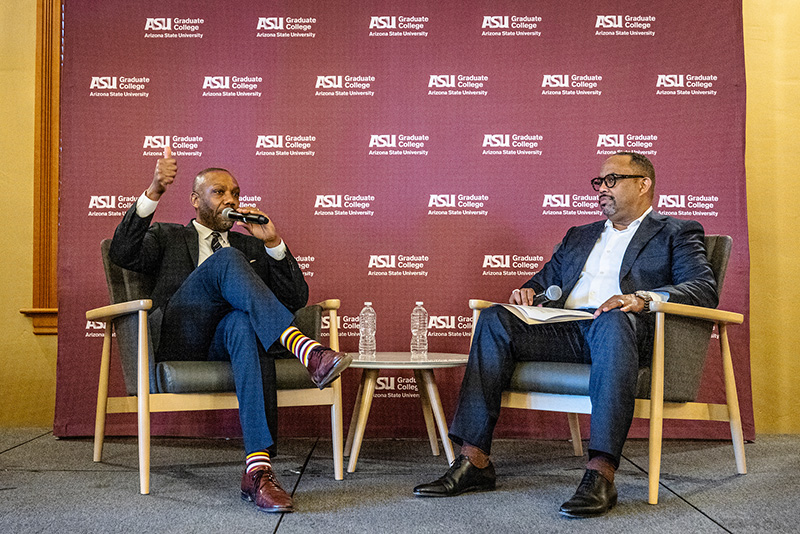Canceling student debt could ease racial wealth divide, researcher says

Decades of racist policies like redlining have extracted wealth from Black communities, but one way to repair the harm would be to cancel student debt, according to a researcher who spoke at Arizona State University.
“There is a big wealth divide that most Black people live with,” said Andre Perry, a senior fellow in the Metropolitan Policy Program of the Brookings Institution.
“I don’t care if you have a PhD or a high income. Most Black people did not receive the intergenerational wealth transfer that their white counterparts did, as a result of federal, state and local policy.”
Perry was the speaker for the 2021 Graduate College Distinguished Lecture on Thursday. His talk, titled “Canceling Student Debt is Anti-Racist (and Why We Must Do It),” explored why Black people typically must take out higher amounts of loans to attend college and why they have a harder time paying them back.
“There’s a reason why Black people have to take out more student loans,” he said. “We were denied the wealth that would have enabled us to pay for college.”
Redlining, the systemic policy of denying mortgages to Black people, created a system of grossly undervaluing property in Black neighborhoods. Perry, author of the book “Know Your Price: Valuing Black Lives and Property in America’s Black Cities,” estimated the lost equity of Black-owned property at $156 billion for the year 2017 alone.
In addition, as the cost of higher education has risen, the incomes of Black college graduates have not kept pace with those of white degree-holders. So because Black borrowers take longer to pay off their loans, they end up paying more in interest.
“One of the most repeated mistakes in this debate is the assumption that all people in a particular income stratum have the ability to repay the loans. That’s missing the lived experience of Black people,” he said.
Andre Perry (left), senior fellow at the Brookings Institution, participated in a Q&A session with Battinto Batts, dean of the ASU Walter Cronkite School of Journalism and Mass Communication, during Perry's talk Oct. 21 in Old Main on the Tempe campus. Photo by Charlie Leight/ASU News
Student debt has become a hot topic, with several debt-cancellation proposals being floated. A study released last week by The Education Trust found that two-thirds of Black borrowers regret taking out student loans. The report, based a nationwide survey of nearly 1,300 Black borrowers, found that 58% said they do not believe that student loans advance racial equality for Black borrowers.
Perry said that student debt is already being canceled every day for small groups of borrowers, such as those who acquired loans through predatory lenders, people in public service and some veterans.
Perry, who said that debt cancellation does not need to be passed by Congress, is optimistic that it will happen in some form.
“I think it’s highly unlikely, when this repayment freeze is over in January 2022, that they will ask students to start repaying in an election year,” he said.
But debt cancellation is only a partial solution.
“At some point we need free college,” he said. “Only in America have we made higher education a luxury. It’s no longer a luxury. Go into the job market without a college degree and see how far you get.”
Perry's talk was followed by a Q&A session with Battinto Batts, the new dean of the Walter Cronkite School of Journalism and Mass Communication.
Batts asked: “There is some opposition to this. Some people say, ‘If students shouldn’t pay for higher education, who should? Taxpayers?’ ”
Perry said that the pandemic showed how beneficial federal aid is, with less reliance on borrowing, more saving and more home buying. He said the same thing would happen if Black people were freed from their monthly student loan payment.
“There’s a lot of skepticism, particularly when it comes to Black folks, on whether we’ll use the money to buy gold chains and jewelry,” he said.
During the pandemic, more Black people started businesses in Black neighborhoods, he said.
“You could argue that was because the unemployment rate was higher, but this idea that you’re going to be irresponsible with that money is unfounded. People want to own a home, they want to own a car, they want to go to work, they want to go to grad school.
“We have got to learn how to trust people more, particularly Black people. That’s white supremacist thinking, that if you somehow get 500 extra dollars you’ll waste it.”
Top image: Andre Perry, senior fellow at the Brookings Institution, was the speaker for the 2021 Graduate College Distinguished Lecture on Thursday at the Tempe campus. His talk was titled, “Canceling Student Debt is Anti-Racist (and Why We Must Do It).” Photo by Charlie Leight/ASU News
More Law, journalism and politics

How ASU is leading the national conversation on journalism and AI
As artificial intelligence continues to advance at a rapid pace, journalism faces both unprecedented opportunity and profound responsibility.At Arizona State University, those challenges are being…

5 takeaways about artificial intelligence and elections
Next year’s midterm elections are happening at a crucial time in the adoption of AI, with concerns that the new technology could pose threats to the process but also have the benefit of easing the…

ASU dominates Rocky Mountain Emmys, showcasing range of talent
Arizona State University stole the spotlight at the Rocky Mountain Southwest Emmys, walking away with an impressive haul of shiny new awards and plenty of bragging rights.University-affiliated…
